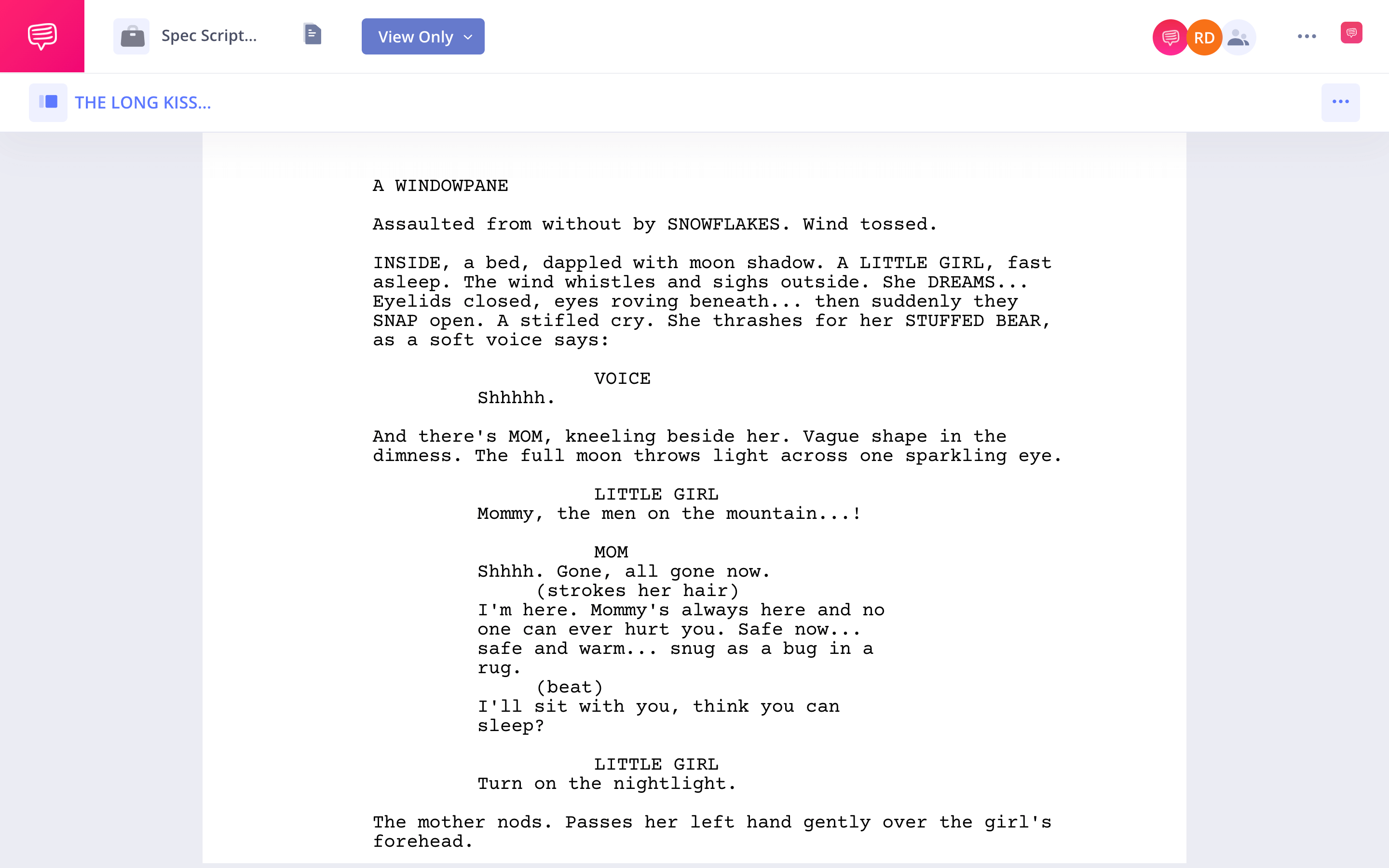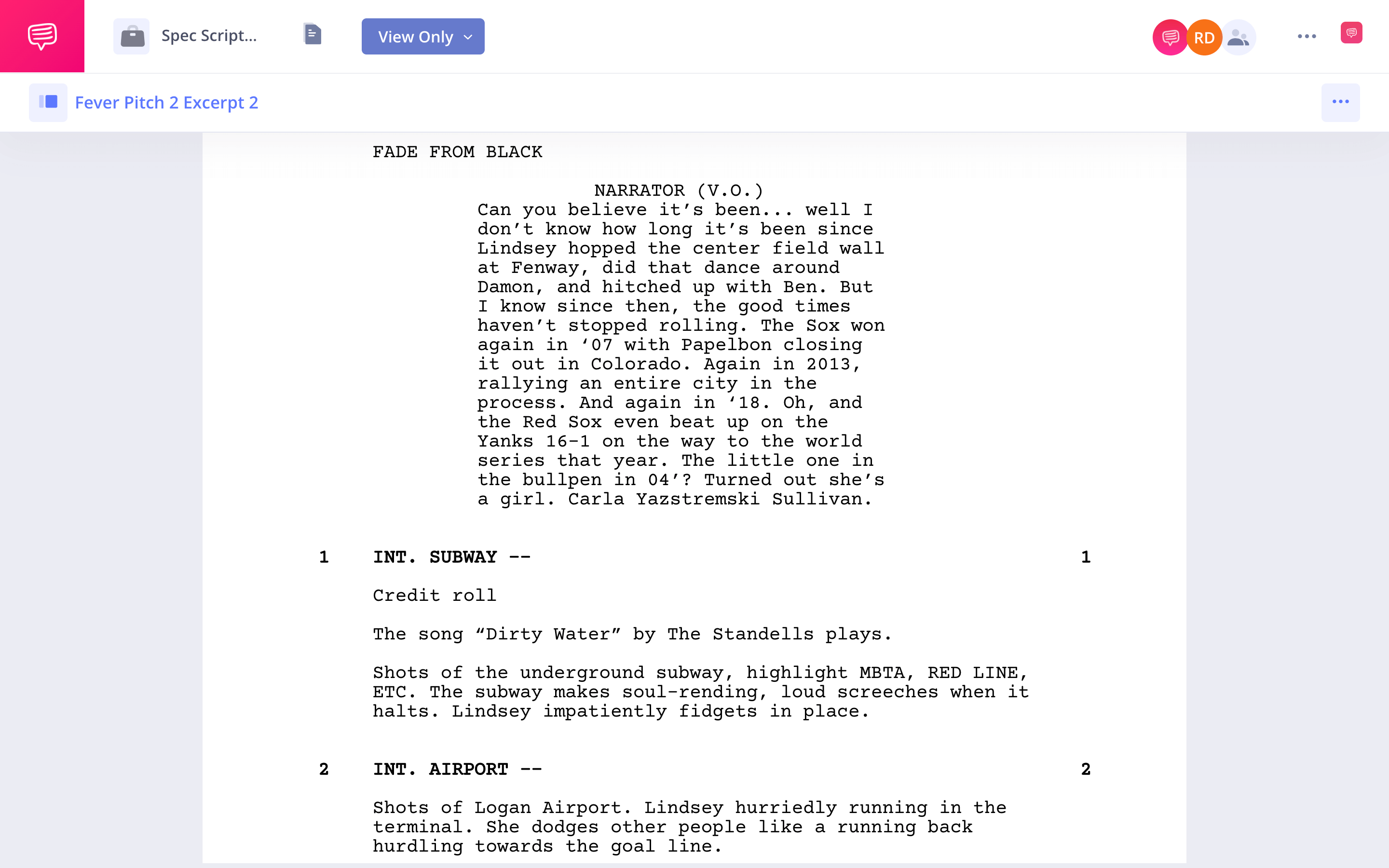Oh yes, we’ve come back to the ever-feared spec script; code-word for a script that isn’t commissioned. Writers far and wide, famous and infamous, all work on spec scripts. But what is a spec script? And what does it look like? Fear not, we’re going to answer those questions by looking at some spec script examples. By the end, you’ll know how spec scripts are written and where to look for more advice on how to start your own.
Spec Writing Screenplays
The state of the spec script scene
In the early years of Hollywood, spec scripts used to be something of a taboo. That’s because most professional writers viewed writers working on spec as “not good enough” to be offered legitimate work. Things changed over time – and eventually, writing on spec became a lucrative career choice.
But of course, as with most things, spec writing proved to be a circle. Currently it’s back to its beginning.
In the following video, Quentin Tarantino makes some enlightening points about the current state of the spec script scene.
How to Write a Good Spec Script • Quentin Tarantino on the Spec Script Scene
In the '90s, Hollywood studios bought spec scripts for millions of dollars. It was regarded as a seller’s market. Today, Hollywood has changed so much that many regard it as neither a seller’s market nor a buyer’s market.
That’s because only 25 spec scripts were sold in 2020, per industry reports. Over the past 10 years, spec script sales have fallen as writers have looked to writers rooms, blogging, magazines, editing, and other jobs for stable income.
If you think about it, it makes complete sense. Who has time to work for free? And not just work for free – but write a movie for free? Little chance. Inflation, cost of living, and student loans have made it near-damn impossible for writers to work on spec.
Still, Tarantino is right. There are some studios still looking for spec scripts. And since there are so few people making them, the ones who do have a greater chance of actually being seen.
So, without further ado, let’s define spec script.
SPEC SCRIPT DEFINITION
What is a spec script?
A spec script is an uncommissioned screenplay – or in other words, a script that’s written without the guarantee a writer will ever be paid for it or have it produced. Spec scripts are also known as “speculative screenplays” because of their non-guaranteed nature.
Famous Spec Scripts:
- North by Northwest
- Good Will Hunting
- The Game
Spec Screenplays Produced
Spec script example that was produced
It’s incredibly difficult to break into Hollywood via the spec script scene. However, it isn’t impossible. In fact, some of the highest-earning screenwriters in the world – such as Shane Black – made a name for themselves with spec scripts. Black has sold a myriad of scripts on spec, grossing more than $10 million in reported sales.
We imported Shane Black’s The Long Kiss Goodnight script into StudioBinder’s screenwriting software to take a closer look at what makes a truly successful spec script. So, without further ado, let’s take a look at one of the most expensive spec scripts ever sold:
What Does a Spec Script Look Like? • Spec Script Example: The Long Kiss Goodnight
Here’s a tip for writing an unsolicited screenplay: make readers ask one question and one question only, “What the hell is going on?” Because no matter what, you’ve gotten their attention. Of course, the true challenge is keeping their attention.
Black did a great job of establishing a mysterious premise with The Long Kiss Goodnight. If you’re writing an “original,” aka a spec that’s not based on an existing IP, then consider utilizing this strategy. You’d be surprised just how many movie genres work with it.
Difference Between Spec Script and Shooting Script
Spec script example, from me
It just so happens that I write scripts in addition to writing here at StudioBinder. As such, I thought it would be a good idea to show you a non-produced spec script example.
This excerpt is taken from a spec script I wrote based on Fever Pitch, aptly titled Fever Pitch 2. We imported the script into StudioBinder’s screenwriting software – check it out below!
Spec Writing • Fever Pitch 2 Spec Script
The first thing you should do when conceptualizing a spec script is choose whether you want to write an original script or a script based on an existing IP. Next, you’re going to want to test that script’s viability. For original scripts, research genres and production costs. For existing IP, research market conditions and past profits.
What do I mean by market conditions? I mean: does the market still embrace the IP? Are stars still willing to work on the IP? Etc.
Let’s take Fever Pitch for example: Fever Pitch was released in 2005 and grossed a reported $50.5 million against a $30 million budget. The film certainly wasn’t a blockbuster success – but it performed well-enough to warrant a sequel; particularly with lower costs.
The biggest challenge for producing a sequel would be getting stars Jimmy Fallon and Drew Barrymore on board. The film literally wouldn’t work without them, which makes writing a spec script a seemingly futile task. Still, writers have to respond to where their inspiration takes them.
Hopefully, this exercise has shown you some of the things that writers face when writing a spec script.
Up Next
How to Write a Spec Script
Looking for more advice on how to write a spec script? Check out our next article on “how to write a spec script” with examples from Breaking Bad, Friday Night Lights, and more. We’ll also show you some pro tips for selling a spec script. By the end, you’ll have a bevy of spec script resources at your disposal.


